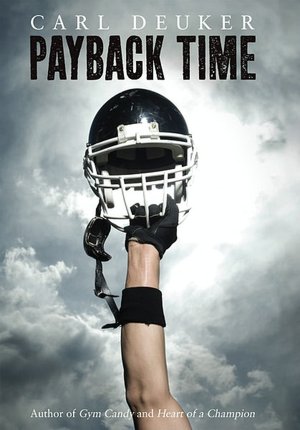Deuker, Carl. Payback Time. New York: Houghton Mifflin, 2010.
Audience: Middle School 13+
Genre: Sports Fiction
Topics of Focus: Football, Body Image, Assumptions, Coming of Age, Self Esteem, Journalism
Red Flags: None
Carl Dueker is well known for his young adult books that appeal to reluctant readers and the sports-minded. His Payback Time continues on this path.
The first-person narrator, Daniel “Mitch” True is an aspiring journalist who recently lost his bid for editor of his high school newspaper. His moniker, Mitch, short for Michelin Man, indicates that he is no stranger to the underdog role or to psychological abuse from both his peers and his own lower self-esteem. Given no better choices, Mitch forges ahead to take on the sports reporter role on the paper. He will not be defeated in the one area he believes he holds skill. He soon teams up with the edgy photographer, Kimi, to dig into the back story of a mysterious new player on the team, Angel. Something about Angel is just not right. He looks too old, he plays too well, and he is too distant to be a typical high school student. No one gets near this kid. Somehow Mitch is encouraged to do a little free-lance work for the Seattle Sun Times, but his editor’s changes to references about Angel in the stories make him even more suspicious of the situation. Mitch becomes convinced that the football team’s Coach McNulty, with the knowledge of the Sun Times’s sports editor, is covering up a cheating scam, and he is determined to uncover it all to become the next Woodward or Bernstein. With Kimi’s assistance, Mitch hits the reporter trenches a bit harder than he should and uncovers more than he bargains for.
The first-person narrator, Daniel “Mitch” True is an aspiring journalist who recently lost his bid for editor of his high school newspaper. His moniker, Mitch, short for Michelin Man, indicates that he is no stranger to the underdog role or to psychological abuse from both his peers and his own lower self-esteem. Given no better choices, Mitch forges ahead to take on the sports reporter role on the paper. He will not be defeated in the one area he believes he holds skill. He soon teams up with the edgy photographer, Kimi, to dig into the back story of a mysterious new player on the team, Angel. Something about Angel is just not right. He looks too old, he plays too well, and he is too distant to be a typical high school student. No one gets near this kid. Somehow Mitch is encouraged to do a little free-lance work for the Seattle Sun Times, but his editor’s changes to references about Angel in the stories make him even more suspicious of the situation. Mitch becomes convinced that the football team’s Coach McNulty, with the knowledge of the Sun Times’s sports editor, is covering up a cheating scam, and he is determined to uncover it all to become the next Woodward or Bernstein. With Kimi’s assistance, Mitch hits the reporter trenches a bit harder than he should and uncovers more than he bargains for.
Dueker’s subplots of Kimi’s challenges with her over-protective father, Mitch’s developing crush on Kimi, and his weight-loss struggles help to move the story along without majorly detracting from the main plot. A drawback for some readers may be the extensive football strategy play by plays. Yet, a frustrated reader will do fine to just skim over those sections to concentrate on Mitch and the unraveling mystery of Angel.
Annotation by Denise Aulik

No comments:
Post a Comment